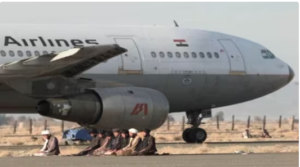IC-814 hijacking: A Tragic Decision That Released a Terrorist Leader and Triggered a Surge in Violence

IC-814 hijacking
The IC-814 Commandeering: Releasing the Fear-based oppressor Masood Azhar
The IC-814 commandeering on December 24, 1999, is a horrid part of India’s set of experiences, denoting a vital second that raised the danger of psychological warfare in South Asia. The episode included the capturing of Indian Carriers Flight IC-814, which was heading out from Kathmandu to New Delhi. Soon after departure, the plane was held onto by five furnished men who diverted the trip to Kandahar, Afghanistan. This demonstration of fear went on for a few days, coming full circle in an emotional stalemate between the ruffians and the Indian government.
The ruffians requested the arrival of three high-profile fear-based oppressors in return for the security of the 176 travelers and group individuals ready. Among those they tried to free was Masood Azhar, a Pakistani psychological militant who was then detained in India. The Indian government confronted a terrible problem: to deliver Azhar and the others or endanger honest regular people.
At last, after serious dealings and huge tension from the general population and groups of prisoners, the Indian government chose to deliver the fear-based oppressors. Masood Azhar was given over to the ruffians, a choice that would have broad ramifications for India and the world.
Masood Azhar’s delivery from Indian guardianship ended up being a defining moment in the scene of worldwide psychological warfare. Soon after his delivery, Azhar established Jaish-e-Mohammed (JeM), a fear-monger association that would become scandalous for its dangerous assaults. JeM was answerable for the absolute most annihilating fear-monger assaults in India, remembering the 2001 assault on the Indian Parliament and the 2019 Pulwama bombard, which killed 40 Indian paramilitary warriors.
Azhar’s ascent to conspicuousness after his delivery from jail highlighted the danger presented by Pakistan-based psychological militant associations, which have for some time been blamed for getting support from components inside the Pakistani foundation. JeM, under Azhar’s initiative, turned into an instrument of intermediary fighting, used to target Indian interests and weaken the district.
The IC-814 capturing likewise essentially affected Indo-Pakistani relations. The episode extended the doubt between the two countries, with India blaming Pakistan for holding onto and supporting fearmongers like Masood Azhar. Regardless of India’s rehashed requests for Azhar’s removal, Pakistan would not hand him over, further stressing discretionary ties.
The arrival of Masood Azhar and the resulting ascent of Jaish-e-Mohammed featured the intricacies of managing psychological oppression. The IC-814 capture was a disconnected occasion as well as an impetus that powered the development of worldwide jihadist organizations. Azhar’s capacity to rearrange and grow his fear-based oppressor exercises subsequent to being delivered exhibited the dangers implied in haggling with psychological militants.
Soon after the IC-814 commandeering, India’s counter-psychological warfare systems developed, with a more prominent accentuation on insight gathering, worldwide participation, and military readiness. In any case, the tradition of commandeering keeps on tormenting the district, as the dangers presented by bunches like Jaish-e-Mohammed remain ever-present.
The IC-814 episode fills in as a sobering sign of the difficulties faced by countries in fighting psychological warfare. It likewise highlights the requirement for worldwide participation in tending to the main drivers of psychological oppression and forestalling the ascent of radical associations.
All in all, the IC-814 seizing was a critical occasion that not only uncovered the weaknesses in India’s security system yet in addition released perhaps one of the most risky psychological militants on the planet, Masood Azhar. The repercussions of this occurrence keep on molding the security elements of South Asia and the more extensive worldwide battle against psychological warfare.
Source: Hindustan Times








